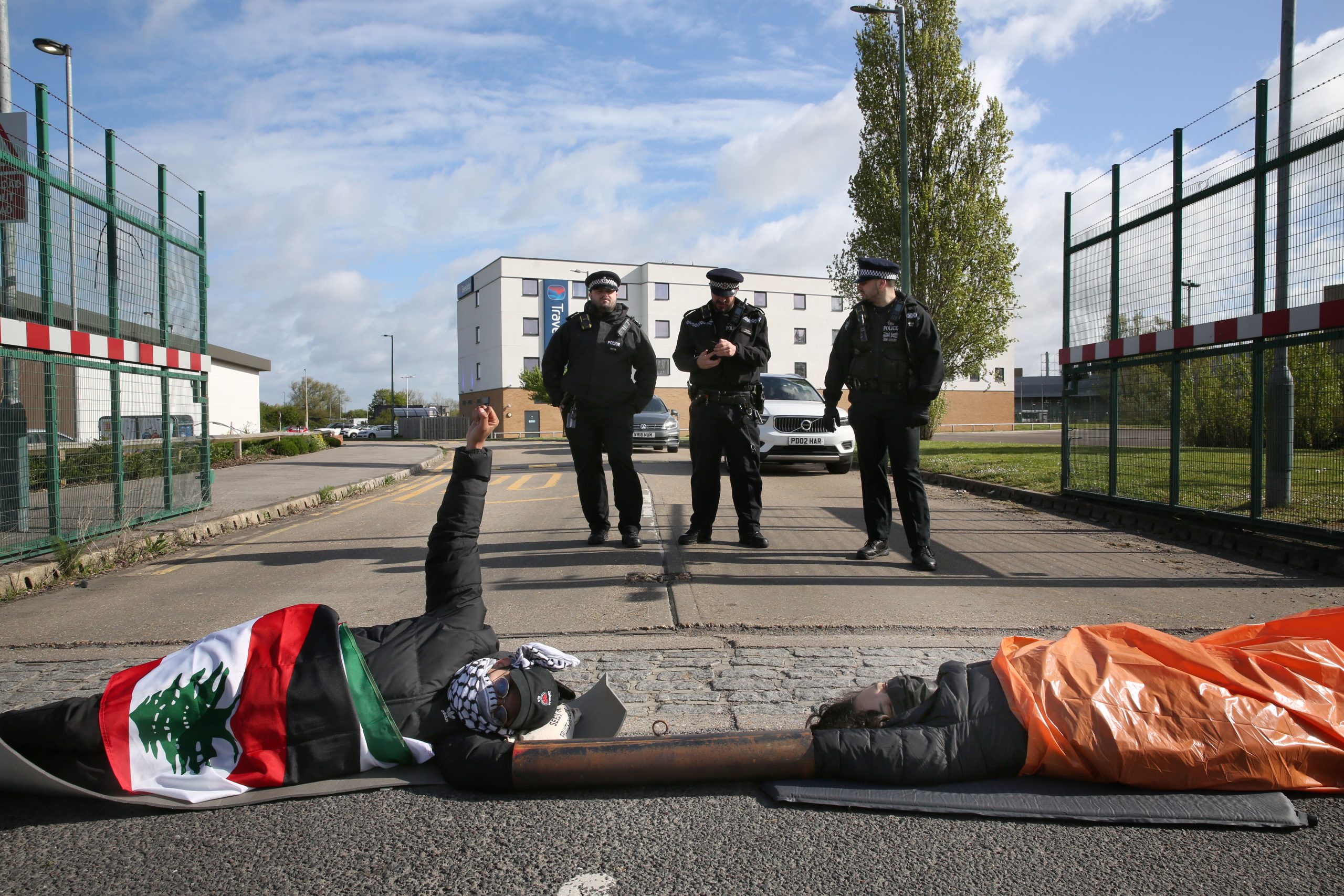In this translated text, Maria Matteo of NoTAV Assembly explains the regeneration of Italy’s old expansionist habits in North Africa and rapid growth of its military, supported by a wave of aggressive extractivism.
Blood, oil and good business. Italian troops wage war in Niger, Libya, the Gulf of Guinea, the Ormuz straits, Iraq, the Mediterranean and many other places besides. Enjoying the silence and indifference of the many, our parliament has approved the refinancing of various neo-colonial ventures currently being undertaken by the Italian armed forces.
The focus is on Africa, where, as of 2021, 17 missions were operating under the red, white and green of the Italian flag (out of a total of 40 worldwide), two more than the previous year. These foreign operations cost a total of €1.2 billion, and involve 9,449 military personnel, an increase compared to last year’s already record-breaking numbers.
The contours of a new Italian geopolitics are delineating themselves ever more clearly. International competition is enclosed within a triangle: with the Mediterranean at its apex and the base marked out between the Sahel and the Persian Gulf. The concept of an “enlarged Mediterranean” is becoming real. Minister of War Lorenzo Guerini and other “industry insiders” have put aside the old rhetoric of humanitarian missions and today speak explicitly of “defending Italian interests abroad”. Italian imperialism no longer conceals itself, again asserting itself as a competitor in a multipolar world of shifting allegiances.
The shifting imperial front line
The decision to build a military base in Niger indicates a desire to establish a permanent Italian presence in the area, turning it into an outpost of ENI (an Italian oil company, one of the big seven on the planet) and its interests in Africa. Overseas operations have become a sort of neo-colonial war for the control of resources. Italian tricolours are flying side-by-side with the ENI flag: yellow with a six-pawed dog. A long trail of blood, petroleum, and gas. The government’s armed diplomacy, designed to defend the enormous profits of ENI, stretches from Libya to the Sahel to the Gulf of Guinea.

These areas are of strategic importance for ENI and its interests. The Italian naval operation in the Gulf of Guinea stretches across the international waters surrounding Nigeria, Ghana, and Ivory Coast. In this area can be found two of the major oil producers in Africa, namely Nigeria and Angola, countries in which ENI is to be found (alongside Ghana and Ivory Coast). The objective of the operation is the protection of offshore oil rigs and extraction installations. ENI today represents the spearhead of Italian colonialism in Africa. Under the loose heading of “security” and the “war on terror”, a story is developing which mixes economic interests with rhetoric around operations to protect the local population. A population that is daily exploited, pillaged, and oppressed by governments that act as accomplices to European, Asian, and American multinationals.
The waves of migration towards wealthier nations are a result of the predatory brutality of neo-colonial policies. Among the objectives of the Italian military interventions is the reinforcement of a frontline in the war against people in movement, an attempt to push back against the migrants banished to Libyan prisons, where torture, rape and murder are everyday occurrences.
Murderous border controls
This frontline has spread even into our own country, where soldiers have been promoted into Judicial Police and are now to be found in the CPR (immigration detention centres), in which surplus bodies are locked away ready to be expelled; in militarised building sites and in the outskirts of Turin, where the war on the poor is implemented through the racially targeted occupation and control of territory.
To save face, at the same time as refinancing military operations, an agenda was proposed that included a “humanitarian” reworking of agreements signed in 2017 with Libya. This came to nothing. The motion to put a halt to the activities of the Libyan Coastguard was voted down by an overwhelming majority of Deputies in parliament. In the end, so as not to disappoint anyone, the approved text provided for a reassessment, in 2022, of “the conditions necessary to move beyond” cooperation with the Libyan Coastguard, transferring their activities to the EU Operation IRINI. A trifle, allowing likewise the right and left (both government and opposition) to declare victory.

Besides, on his recent visit to Italy the Libyan president received ample guarantees of support from the Italian government. For months, Mario Draghi (Prime Minister of Italy) has been putting pressure on the EU to pay, not only Turkey, but also Libya to detain migrants in the prisons-cum-concentration camps of Tripoli. In our country there are military ports and airports, firing ranges, target ranges, spaces where ordnance is tested, fighter-bombers, drones, ships and submarines. Places of death also for those who live nearby: fuels, depleted uranium ammunition, chemical warfare equipment all irreversibly contaminate land and sea. The conflicts we can expect in the next decade will all first be subjected to test runs in the military bases already littered across Italy.
Italy’s powerful military industry
Italian weaponry, above all those produced by the publicly owned defence contractor Leonardo, is present in every theatre of war on earth. Wars which appear distant are in fact incredibly close to home: the weapons killing civilians across the globe are produced within spitting distance of the parks in which our children play. Every two years, between November and December, Turin hosts an “Aerospace and Defence Meeting”, a trade fair for the defence and aerospace industry. Now in its eighth iteration, this year the convention will take place at the Oval Lingotto, a conference centre that forms a part of the commercial complex built from the ashes of the ex-FIAT factory.
The trade fair is restricted to insiders: producers within the sector, governments and international organisations, representatives of the armed forces of various states and defence contractors. At the last event 600 companies, 1,300 buyers and sellers alongside representatives from 30 governments participated. The real core of the convention are the bilateral meetings aimed at hammering out agreements of cooperation and sale: in 2019 there were over 7,500 of these. Among the more notable sponsors of the event are the regional government of Piedmont and the Sub-Alpine Chamber of Commerce. Seventh in the world and fourth in Europe, with an annual turnover of over €16.4 billion and counting 47,274 highly trained employees, the Italian aerospace industry represents one of the largest manufacturing sectors involved in the production of high-tech integrated systems.
The military aerospace industry is a Piedmontese speciality, with an annual turnover of €3.9 billion and 14,800 employees. The greater part of Italian aerospace firms are therefore to be found in Piedmont. The region offers a full range of expertise and credentials, alongside a network of production that connects productive and service sectors in intense cooperation with universities and other places of training and education. In Piedmont, there exist a good five leading international actors: Leonardo, Avio Aero, Collins Aerospace, Thales Alenia Space, and ALTEC. Around the major industries can also be found a wide-range of small and medium enterprises, who in their turn participate in Turin’s aerospace biennale, an event that is also attended by the majority of the world’s big players in the sector.
In photos of past biennales hives of tables can be seen, at which well-dressed attendees buy and sell playthings designed to destroy entire cities, massacre civilians, poison soil and rivers. War toys. Wars fought with weapons designed and built a few steps from our front doors. The arms industry is a business that is never in crisis. And Italy is happy to do business like any other country. Currently under construction in Turin is an “Aerospace City”, a new technology hub dedicated to the arms trade. The ministry of economic development, MISE, has deemed Piedmont an area of complex industrial crisis and has decided to invest PRRI (conversion and industrial redevelopment projects) funds in continuing to finance the now washed-out automotive sector and the flourishing arms and aerospace industry, allocating them €140 million.
The project will involve the Piedmont regional government, the City Council, Turin Polytechnic University, the University of Turin, the Turin Chamber of Commerce, the local branch of Confindustria (the Italian equivalent of the CBI), API (an oil company), CIM 4.0 (an organisation tasked with tech boosterism), the Piedmont Aerospace District, and TNE (New Economy Turin – an attempt to revitalise industrial space in the south of the city vacated by FIAT). Needless to say, those of us who actually live in Piedmont probably have other priorities than these, such as housing, wages, health, education. Try and imagine how much better our lives would be if the billions set aside for the detention of men, women and children in Libyan concentration camps, for guaranteeing the interests of ENI in Africa, for investment in armaments and for putting soldiers on the street, were used for schools, healthcare, and transport.
Imagine being done with it, along with the state, the bosses, the military, the police. They tell us the fairy tale that a complex society is ungovernable from below, all the while drowning us in the chaos of the centralised, bureaucratised management of schools, hospitals, public transport. Striving for the construction of self-organised local assemblies, social spaces, schools, hospitals, clinics, is not a utopia but the sole political horizon capable of superseding the state and capitalism. Shutting down military interventions abroad, boycotting ENI, throwing the military off our streets, blockading the production and transport of weapons, opposing the defence and aerospace trade fair: these are all concrete horizons for our struggle.
~Maria Matteo, translated by Rees Nicolas








